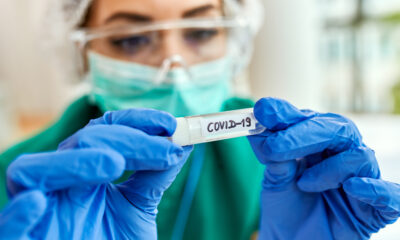
Community
Vaccines shown to be effective against Beta and Delta
Published
3 years agoon
By
Nicola MiltzThe rapidly-transmissible Delta variant has thrown yet another gigantic curve ball into the COVID-19 mix, but experts this week said vaccines were effective against it.
The Delta variant is so far the most transmissible form of the COVID-19 virus. It’s steadily taking over as the dominant variant in parts of South Africa, and is able to spread much more efficiently between people compared to the other variants, scientists say.
They are continuing to study how well current vaccines work against the Delta variant. Research being done internationally and locally shows that the Pfizer vaccine is protective against the Delta variant, also known as the B.1.617.2, found in Gauteng, KwaZulu-Natal, the Eastern Cape, the Free State, and the Western Cape.
While roughly 2.9 million people have thus far been vaccinated in the country, experts stress that major anti-COVID-19 measures have to be maintained until more people have been jabbed as hospitals are overwhelmed. There is also concern that people previously infected with the Beta variant could be susceptible to reinfection with Delta. This research is ongoing.
Alon Rappaport, Pfizer’s medical director in Israel, said on 24 June that the Pfizer-BioNTech vaccine was highly effective against the Delta variant of COVID-19. “The data we have today, accumulating from research we are conducting at the lab and including data from those places where the Indian variant, Delta, has replaced the British variant as the common variant, point to our vaccine being very effective, about 90%, in preventing the coronavirus disease, COVID-19.”
Dr Ronald Whelan, the chief commercial officer of Discovery Health, told the SA Jewish Report there was lots to be positive about.
He said Discovery had done an initial analysis on members over the age of 60 who had received the first shot of Pfizer versus others who hadn’t been vaccinated, which showed “promising and exciting” results.
“We have found people who were 14 days or more post vaccination showed roughly a 70% reduction of transmission of infection and roughly a 70% percent reduction in hospitalisation for those who had become infected after the first dose,” Whelan said. “This is very exciting and promising. It shows that there will be promising results for the Pfizer vaccine in South Africa, which is a relief.
“We have evidence to suggest in an environment where you have both Beta and Delta variants, the Pfizer vaccine is proving to be very effective.
“This is real-world evidence that the vaccine will work 14 days after the first dose, and it’s reasonable to expect that it will be significantly more effective following the second dose.”
Analysis is still emerging about the effectiveness of the Johnson & Johnson (J&J) vaccine against the Delta variant.
Experts say all indications are that the J&J vaccine will retain its effectiveness, particularly against severe disease and hospitalisation.
Whelan said across all hospitals, there were far fewer healthcare workers (who had received the J&J vaccine as part of the Sisonke trial) infected now compared with the first and second waves. This, he said, suggested the effectiveness of the J&J vaccine.
“They are both excellent vaccines measured against severe disease and hospitalisation,” he said, pointing out that there was talk about a booster dose of J&J, probably six months after the initial dose.
While South Africa is certainly behind many parts of the world, Whelan said the private-sector machinery was working and vaccinating at a pace. “There is a very healthy vaccine supply in the country, and there is good infrastructure to deliver vaccines. The system is poised for an accelerated rollout, particularly from August onwards,” he said.
On 15 June 2021, the World Health Organization said that preliminary data showed the Pfizer vaccine was 75% effective against symptomatic disease from the Beta variant after two doses. It’s 88% effective against the Delta variant, and 93% against Alpha. All three variants are present in South Africa.
It also said that preliminary data showed that the J&J vaccine was 64% effective against symptomatic disease from the Beta variant, and 81% effective against severe disease. There is insufficient data to understand how the Delta and Alpha variants could affect the efficacy of this vaccine.
All scientists agree that being vaccinated in South Africa doesn’t mean you won’t get infected, but there can be comfort knowing that the risk of being hospitalised or dying is significantly diminished.
It remains law for South Africans to wear a mask when in public, and businesses must enforce physical distancing and good hand hygiene. Those who are vaccinated have good reason to keep following these protocols for the sake of their health and others, experts said this week.
The National Institute for Communicable Diseases has urged those who are vaccinated to be cautious as they are still at risk of contracting COVID-19. The disease will be milder in comparison to those who are unvaccinated, decreasing the risk of severe illness, hospitalisation, and death.
At the time of going to press, Hatzolah had 1 030 active cases, of which 422 were new cases. There were 55 people in hospital, and 105 were being treated at home with oxygen.










